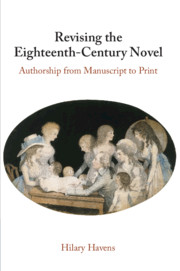‘… Revising the Eighteenth-Century Novel persuasively delivers on its premises and also recommends a novel tool that scholars will likely find valuable in their reconstruction of physically impaired manuscripts.’
A. W. Lee
Source: Choice
‘This study's careful attention to a massive archive makes it a valuable piece of scholarship … Richardson, Burney, Austen, and Edgeworth were each prolific writers and Havens' thorough coverage of all four is a service to the field … [and] because of its accessible focus on themes of gendered (dis)empowerment in the lives and works of its canonical figures, I can pay this study the tribute, rarer than it should be, of saying that I expect to recommend it to undergraduates …’
Jacob Sider Jost
Source: The Eighteenth-century intelligencer
‘Hilary Havens’s Revising the Eighteenth-Century Novel: Authorship from Manuscript to Print is another important intervention in the history of both the novel and ideas of authorship … Havens has recovered previously hidden evidence about revision using digital palaeography - a powerful and fruitful new technology.’
David Womersley
Source: SEL Studies in English Literature 1500–1900
‘Revising the Eighteenth-Century Novel is a valuable contribution to our understanding of how the genre emerged and how authors crafted their texts in a social world over time … The real impact of Revising the Eighteenth-Century Novel is its central argument: that novels were the creation of many people and many influences, that even in their printed form they should not be considered textually stable or 'final,' and that all literary scholars need to be more aware of the influences that created the text that they are reading and more open to the idea that those influences may have contradicted the initial intent of the author.’
Leah Orr
Source: Reception: Texts, Readers, Audiences, History
‘With careful structuring, and a mostly lucid style, this industrious book claims new insights into the 'networks' that, via Bruno Latour, are already well established as significant in this field.’
Min Wild
Source: Times Literary Supplement
‘… this is essentially an interpretative, critical book … This is a rewarding study, one to argue with and learn from.’
Aileen Douglas
Source: Eighteenth-Century Fiction
‘Havens’s book is a must-read for people interested in authorial networks and revision, regardless of the period and authors they study, and exceptionally useful for those interested in eighteenth-and early nineteenth-century authorship, and manuscript and publication practices, as well as scholars of Richardson, Burney, Austen, Edgeworth, Sterne, Lewis, and Godwin. Revising the Eighteenth-Century Novel ultimately not only provides excellent examples and amazing insight into ‘authorship from manuscript to print,’ as the book’s subtitle explains, but also asks its readers to understand authorship as a network built upon reading, writing, dialogue, and revision. After one reads Havens’s book, it would be impossible not to do that.’
Misty Krueger
Source: Eighteenth-Century Life
‘In developing ‘a model of ‘networked authorship’,’ Havens contributes to a growing scholarship that recovers eighteenth-century writing practices and book culture from overdetermined interpretations rooted in the ‘individualistic view of authorship that arose during the Romantic period.’
Mark Alan Mattes
Source: Eighteenth-Century Studies
‘This is a compact but powerful book. Much of the evidence is new, and the argument is salient.’
George Justice
Source: Studies in the Novel
‘The organizational structure of the book is water-tight, clear, and lends itself well to teaching … Revising the Eighteenth-Century Novel is likely to be influential.’
Emily Friedman
Source: The Review of English Studies
‘Revising the Eighteenth-Century Novel remains an important entry in a growing body of scholarship on eighteenth-century manuscripts and literary circles. Taken together, this may do for the novel what twentieth-century criticism did for early modern drama-demonstrating that the text is not a singular ‘event’ emerging from a singular great voice, but an ever-shifting network of processes, responses and contributions that can open up fresh interpretative possibilities.’
Natasha Simonova
Source: The Scriblerian and the Kit-Cats



